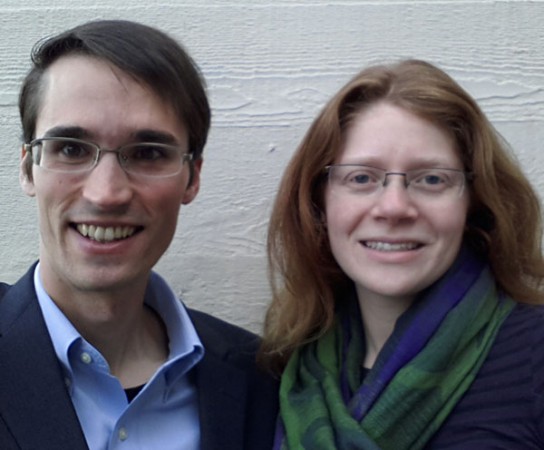
WattTime is putting the ‘smart’ in smart devices
by Student Energy

This Cleantech Youth Profile continues our series of Q&A interviews with some of Student Energy’s most innovative clean technology entrepreneurs and researchers
WattTime helps smart devices such as thermostats or electric vehicles automatically run on the cleanest power available. Gavin McCormick, Co-founder and executive director and Anna Schneider, Co-founder and CTO, met as PhD students at UC Berkeley and bonded over their passion for innovative energy data projects.
Give us the elevator pitch on your work
To reduce emissions from fossil fuels, we’re all accustomed to hearing that we should use less electricity. But with the rise of smart devices, WattTime offers a totally new solution: just set your devices to use power at times when the grid is providing the cleanest energy. Our “environmental demand response” data platform empowers homeowners, building managers, and organizations to directly lower the carbon footprints of any electric equipment, and drives revenue towards clean energy generators.
Tell us about the spark that led to you pursue this work
As part of his PhD research, Gavin developed new methods to determine the environmental impact of using electricity at particular times. He then realized that many companies were claiming environmental benefits through selling timing tools that actually increased pollution! WattTime is our attempt to do better.
What have been the biggest challenges for you to date?
One big decision was the choice to be a nonprofit. Like many cleantech projects, we wanted a legal structure that would match our mission and support our growth. Even though we are a software startup with a scalable revenue model, we eventually decided that a nonprofit structure has the best mix of features for our needs.
What involvement has your university had in your work in clean tech?
UC Berkeley has a great community of talented people eager to work on exciting, impactful projects. The help of our friends in departments across campus, from economics to engineering to architecture, has been invaluable. We’ve also benefited from Berkeley’s entrepreneurship programs, including an “apps for good” incubator.
How have you been funded thus far and what’s next on the funding and revenue front?
Our past funding has come primarily from weekend competitions and student contests. And we’re so excited to have our first major grant lined up! Next up: stepping up our game on business development.
Compare the U.S. to other jurisdictions on the cleantech front
Open energy data is the underpinning of WattTime, and of a growing number of other smart grid and home energy management startups around the world. Although we’re starting in the U.S., the kind of data we work with is also available internationally, including in Canada, Australia, the U.K., and France.
What is one thing you would change in the U.S. to spur the cleantech industry?
The US electricity system is in the midst of a major transition away from coal and towards flexible distributed resources like renewables, demand response, and storage. We’re optimistic that the US EPA’s recently proposed carbon targets would encourage the development and growth of innovative solutions to accelerate this transition.
Where you see yourself in 10 years?
We hope that clean energy timing and the Internet of Things will grow together over the next decade into a powerful force for good on the grid.
What advice would you give to other students researching or working in clean tech?
Check out a hackathon! These weekend events aren’t just for coders—they’re great venues for people from all sorts of backgrounds to join the local cleantech community, grow your skills, flesh out your big idea, and maybe even win a prize.
